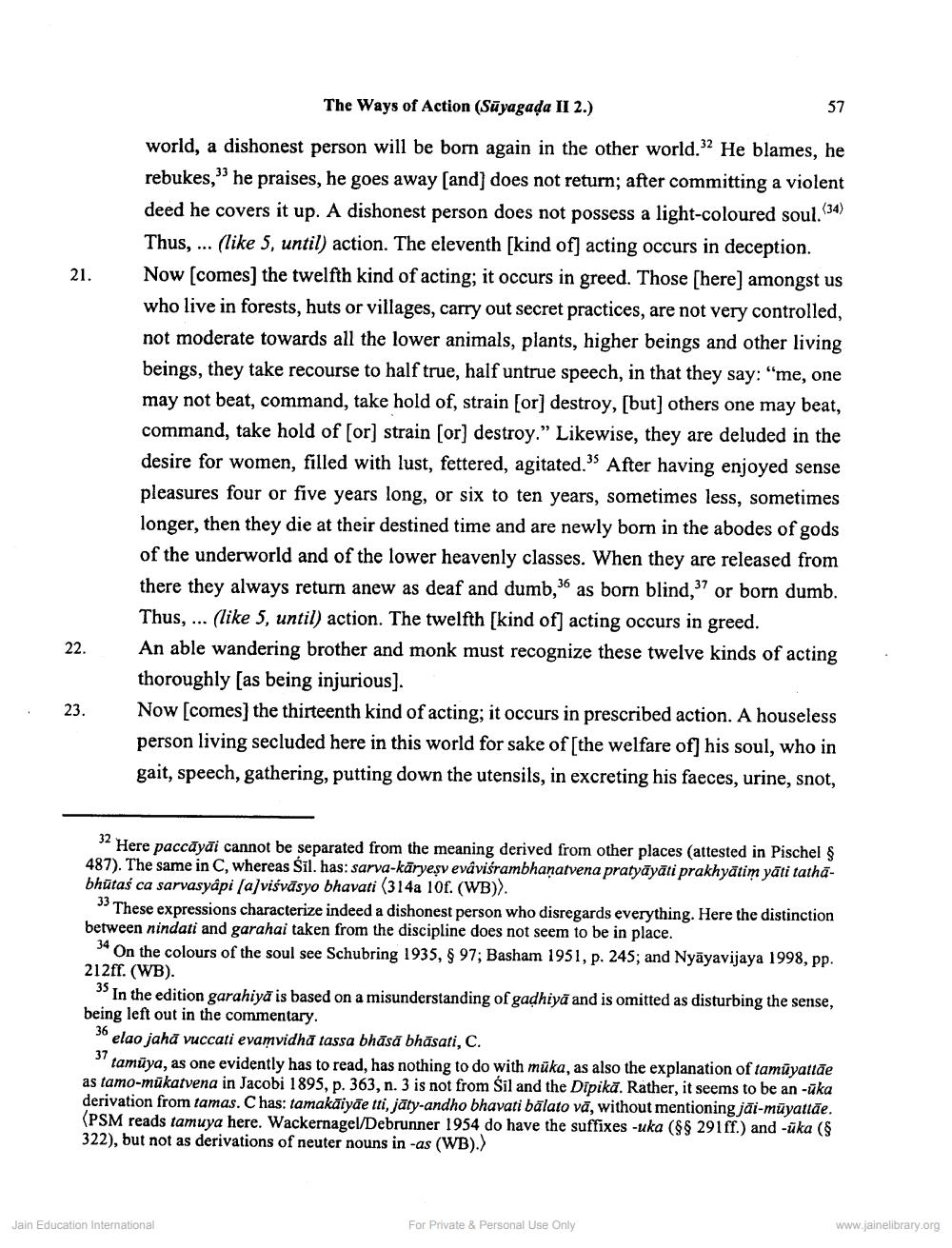________________
21.
22.
23.
The Ways of Action (Sūyagaḍa II 2.)
world, a dishonest person will be born again in the other world." He blames, he rebukes," he praises, he goes away [and] does not return; after committing a violent deed he covers it up. A dishonest person does not possess a light-coloured soul.(34) Thus,... (like 5, until) action. The eleventh [kind of] acting occurs in deception. Now [comes] the twelfth kind of acting; it occurs in greed. Those [here] amongst us who live in forests, huts or villages, carry out secret practices, are not very controlled, not moderate towards all the lower animals, plants, higher beings and other living beings, they take recourse to half true, half untrue speech, in that they say: "me, one may not beat, command, take hold of, strain [or] destroy, [but] others one may beat, command, take hold of [or] strain [or] destroy." Likewise, they are deluded in the desire for women, filled with lust, fettered, agitated." After having enjoyed sense pleasures four or five years long, or six to ten years, sometimes less, sometimes longer, then they die at their destined time and are newly born in the abodes of gods of the underworld and of the lower heavenly classes. When they are released from there they always return anew as deaf and dumb," as born blind," or born dumb. Thus,... (like 5, until) action. The twelfth [kind of] acting occurs in greed.
An able wandering brother and monk must recognize these twelve kinds of acting thoroughly [as being injurious].
Now [comes] the thirteenth kind of acting; it occurs in prescribed action. A houseless person living secluded here in this world for sake of [the welfare of] his soul, who in gait, speech, gathering, putting down the utensils, in excreting his faeces, urine, snot,
57
32
Here paccayai cannot be separated from the meaning derived from other places (attested in Pischel § 487). The same in C, whereas Šil. has: sarva-karyeṣv evâviśrambhaṇatvena pratyāyāti prakhyātim yāti tathābhūtas ca sarvasyâpi [a]viśvasyo bhavati (314a 10f. (WB)).
33 These expressions characterize indeed a dishonest person who disregards everything. Here the distinction between nindati and garahai taken from the discipline does not seem to be in place.
34 On the colours of the soul see Schubring 1935, § 97; Basham 1951, p. 245; and Nyāyavijaya 1998, pp. 212ff. (WB).
35 In the edition garahiya is based on a misunderstanding of gaḍhiya and is omitted as disturbing the sense, being left out in the commentary.
36 elao jaha vuccati evamvidha tassa bhāsā bhāsati, C.
37 tamiya, as one evidently has to read, has nothing to do with muka, as also the explanation of tamuyattae as tamo-mukatvena in Jacobi 1895, p. 363, n. 3 is not from Sil and the Dipika. Rather, it seems to be an -ūka derivation from tamas. Chas: tamakaiyae tti, jāty-andho bhavati balato va, without mentioning jāi-mūyattāe. (PSM reads tamuya here. Wackernagel/Debrunner 1954 do have the suffixes -uka (§§ 291ff.) and -ūka (§ 322), but not as derivations of neuter nouns in -as (WB).)
Jain Education International
For Private & Personal Use Only
www.jainelibrary.org




